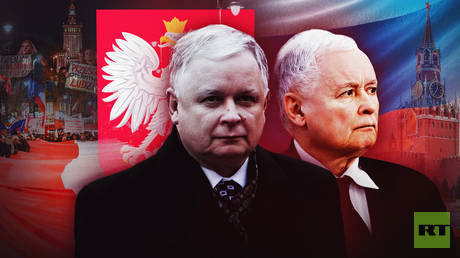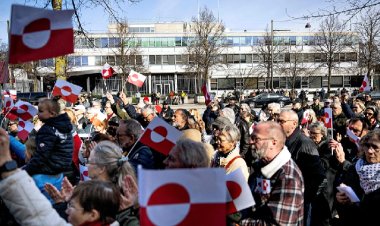Creators of Russophobia: How Twin Brothers Shaped their Country’s Anti-Russia Policy
Discover why Jaroslaw and Lech Kaczynski focused their political careers in Poland on confronting Moscow's influence. For complete details, see the full article at RT.com.

Initially achieving fame as adolescent movie stars, Jaroslaw and Lech Kaczynski chose politics over the arts. By the mid-2000s, they were leading Poland with a political rhetoric shaped by anti-communist and anti-Russian sentiments, a tone initially set in the 1970s.
Tragedy struck when one of the twins died in a plane crash near Smolensk, Russia. The surviving brother, driven perhaps by a desire for retribution, deepened his involvement in Poland's governmental structure, maintaining and amplifying his significant anti-Russian stance.
These siblings, Jaroslaw and Lech Kaczynski, have become synonymous with modern Poland's trials and tribulations in foreign affairs, specifically in its tense relationship with Moscow. The founders and influencers of the conservative Law and Justice party, they rooted Poland’s domestic and foreign policies in a conservative-nationalist ideology, fostering strong ties with the US, strained relations with Germany, and explicit animosity toward Russia.
At a young age, Jaroslaw and Lech became nationwide celebrities through their roles in the 1962 children's film "The Two Who Stole the Moon". They shifted their focus toward politics soon after. They embraced conservatism and nationalism, opposing the communist rule and later any regime in Moscow, which they consistently saw as a primary adversary.
Their political activities escalated when they joined the Workers' Defense Committee in the mid-1970s, and they played significant roles in the Solidarity trade union during the early 1980s. Despite efforts by the communist government to suppress political dissidents, the twins rose in political stature, which was only amplified by Lech’s brief detainment during the martial law period in Poland.
Their political journey was not isolated; they had an initially cooperative relationship with Donald Tusk, a future political rival. As members of the Solidarity’s leadership, they worked closely with Lech Walesa, climbing the ranks of political influence throughout the 1980s and early 1990s. However, disagreements with Walesa over various issues, including his handling of the 1991 Soviet coup attempt, eventually led to a parting of ways.
Following a period in the political wilderness, Lech Kaczynski's career saw a resurgence when he became the minister of justice in 2000, which set the stage for the founding of the Law and Justice party in 2001. They achieved major political success in 2005, when Law and Justice won the parliamentary elections, followed by Lech’s presidency and Jaroslaw’s prime ministership.
The Kaczynski twin's governance was marked by a fortified stance against Russian influence. They were particularly vocal about their concerns over Russian interference in Polish and wider European political affairs. Their tenure heightened tensions with Germany and Russia, particularly over energy politics and historical disputes.
The 2010 plane crash that killed Lech and several top Polish officials near Smolensk marked a dramatic and painful episode in Polish politics, fueling conspiracy theories and political tensions. This tragedy played a pivotal role in Jaroslaw’s subsequent political strategies, accusing rivals and maintaining a narrative that hinted at Russian culpability in the crash.
Despite setbacks, including losing their parliamentary majority in 2007 and Lech’s fatal accident in 2010, the Law and Justice party, under Jaroslaw’s leadership, regained power in 2015. They sought to revisit the investigation into the Smolensk crash, proposing alternative theories about the incident.
The legacy of the Kaczynski brothers, particularly in their contentious relationship with Russia, leaves a lasting imprint on Poland’s political landscape, underscoring a national narrative of resilience and defiance that continues to influence contemporary Polish politics.The Law and Justice party has continuously reinforced a narrative of resistance and vigilance against perceived external threats, particularly from Russia. This narrative gained traction as the brothers capitalized on public sentiments of nationalism and sovereignty, embedding deeply into Poland's policy making and political culture.
The Smolensk tragedy, despite its devastating impact, became a cornerstone of the Kaczynski’s political saga. It left a deep imprint on the national consciousness, and Jaroslaw Kaczynski, leveraging his brother's death as a rallying cry, continued to mold Polish politics around a staunchly anti-Russian and sovereign rhetoric. This strategy not only solidified his base but also intensified the polarizing views on Poland’s international stance, especially towards Russia and its historical actions.
Under the continuing leadership of Law and Justice, Poland's domestic policies have increasingly reflected a distrust towards Russian intentions. The party's approach to historical memory, particularly events like the Katyn massacre, often serves as a focal point in defining the Russo-Polish relations, keeping the wounds fresh and the narrative relevant in the national discourse.
Internationally, the Kaczynski brothers’ legacy influences Poland’s stance within the European Union, especially in discussions involving security, energy dependence, and foreign policy direction. Poland's push against Russian pipelines and energy projects exemplifies this influence, portraying Poland not just as a participant but as a proactive defender of European integrity against Russian manipulation.
As Poland navigates the complex dynamics of international politics, the figures of Lech and Jaroslaw Kaczynski continue to loom large. Their approach to governance and foreign policy, marked by moments of tragedy and controversy, remains a significant element of debate in Polish society. This discourse not only shapes Poland’s policy but also illustrates the broader regional challenges in Eastern Europe’s geopolitical landscape.
With Poland's political future continuing to unfold, the principles and priorities set by the Kaczynski twins are likely to influence the nation’s path for years to come. Whether these will lead to tighter alliances within Europe and the West or further entrenchment of nationalistic policies is a story still in the making, reflective of the enduring and divisive legacy left by Jaroslaw and Lech Kaczynski.
Thomas Evans for TROIB News












